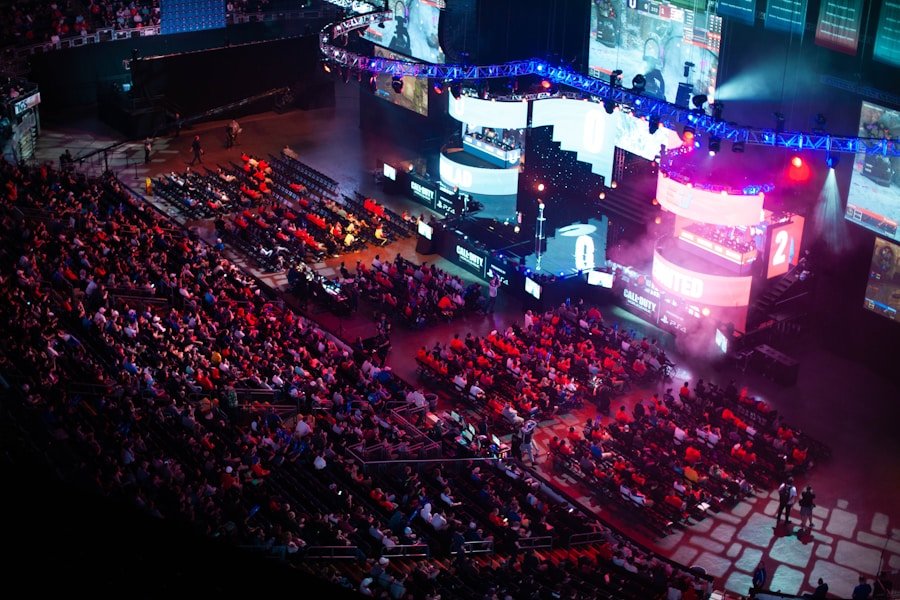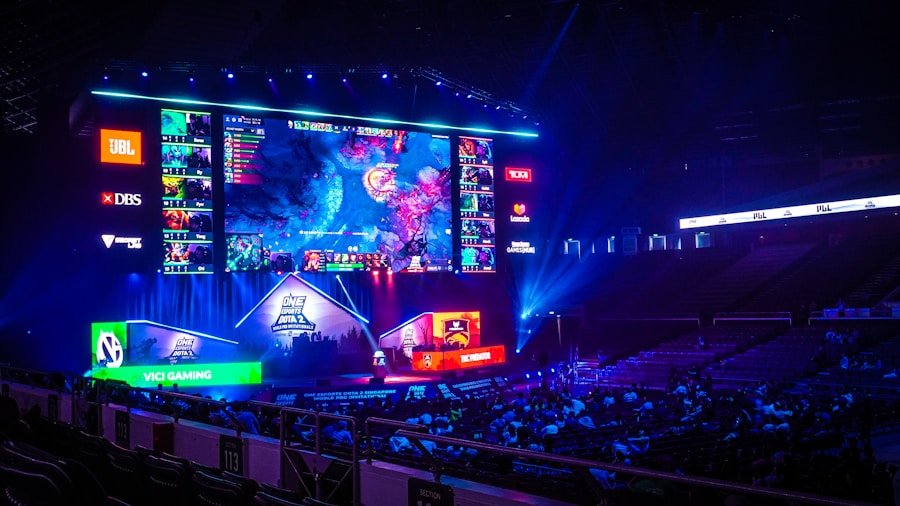Now Reading: 2022 Esports Tournaments Schedule: Plan Your Gaming Calendar
-
01
2022 Esports Tournaments Schedule: Plan Your Gaming Calendar
2022 Esports Tournaments Schedule: Plan Your Gaming Calendar

As I delve into the world of esports, I find myself captivated by the sheer scale and excitement of esports tournaments. These events have transformed competitive gaming from a niche hobby into a global phenomenon, attracting millions of viewers and participants alike. Esports tournaments serve as the pinnacle of competitive gaming, where players showcase their skills, strategies, and teamwork in front of enthusiastic audiences.
The atmosphere is electric, filled with the cheers of fans and the palpable tension of competition. It’s a realm where dedication and talent converge, creating unforgettable moments that resonate with both players and spectators. The rise of esports tournaments has not only elevated gaming as a legitimate sport but has also fostered a vibrant community.
Gamers from diverse backgrounds come together to celebrate their passion, forming connections that transcend geographical boundaries. As I explore this dynamic landscape, I am continually amazed by the evolution of esports, from its humble beginnings to the multi-billion-dollar industry it has become today. With a plethora of games and formats, there’s something for everyone in the world of esports tournaments, making it an exciting time to be involved in this ever-expanding universe.
Key Takeaways
- Esports tournaments are competitive events where professional gamers compete in various video games for prizes and recognition.
- Major esports tournaments in 2022 include The International for Dota 2, League of Legends World Championship, and the Fortnite World Cup.
- Regional esports tournaments provide opportunities for local talent to showcase their skills and compete on a smaller scale.
- Online tournaments offer convenience and accessibility, while offline tournaments provide a more immersive and social experience.
- Up-and-coming esports games and tournaments to watch out for include Valorant, Apex Legends, and Rocket League.
Major Esports Tournaments in 2022
The International 2022: A Dota 2 Extravaganza
One of the standout events was The International 2022, held for Dota 2 enthusiasts. This tournament not only showcased the best teams from around the globe but also featured an impressive prize pool that exceeded $18 million. The intensity of the matches was palpable, with teams battling it out for glory and recognition in front of a live audience. Watching the strategies unfold and witnessing the skillful plays made it clear why Dota 2 has such a dedicated following.
League of Legends World Championship: A Spectacle to Rival Traditional Sports
Another significant tournament that caught my attention was the League of Legends World Championship. This event has become a staple in the esports calendar, drawing in millions of viewers and creating a spectacle that rivals traditional sports finals. The 2022 edition was no exception, with teams from various regions competing fiercely for the coveted Summoner’s Cup. The production quality was top-notch, with stunning visuals and engaging commentary that kept fans on the edge of their seats.
A Sense of Camaraderie Among Fellow Fans
As I watched these tournaments unfold, I felt a sense of camaraderie with fellow fans, all united by our love for competitive gaming.
Regional Esports Tournaments

While major tournaments often steal the spotlight, regional esports tournaments play a crucial role in nurturing local talent and fostering community engagement. These events provide aspiring gamers with opportunities to compete at various skill levels, allowing them to gain experience and exposure. I’ve had the chance to attend several regional tournaments, and each experience has been unique and rewarding.
The atmosphere is often more intimate than larger events, creating a sense of connection among participants and spectators alike. In my experience, regional tournaments often highlight emerging games and genres that may not yet have reached mainstream popularity. This diversity enriches the esports landscape, as players experiment with different titles and formats.
I’ve seen firsthand how these events can ignite passion in local communities, inspiring young gamers to pursue their dreams. The stories of underdog teams rising through the ranks resonate deeply with me, reminding me that every champion starts somewhere. Regional tournaments are not just competitions; they are celebrations of gaming culture that bring people together.
The debate between online and offline tournaments is one that I find particularly intriguing. Each format has its own set of advantages and challenges, shaping the overall experience for players and fans alike. Online tournaments have gained immense popularity, especially in recent years due to their accessibility.
I appreciate how they allow players from different parts of the world to compete without the need for travel expenses or logistical hurdles. This inclusivity opens doors for many aspiring gamers who may not have had the chance to participate in traditional offline events. However, there’s something undeniably special about offline tournaments that online events often struggle to replicate.
The energy in a live venue is electric; I can feel the excitement in the air as fans cheer for their favorite teams and players. The camaraderie among attendees creates an unforgettable atmosphere that enhances the overall experience. Additionally, offline tournaments often feature elaborate production values, including stage setups and live commentary that elevate the viewing experience.
While online tournaments have their merits, I find myself drawn to the unique thrill of being part of an audience at an offline event.
Up-and-Coming Esports Games and Tournaments
As I look ahead to the future of esports, I can’t help but feel excited about the up-and-coming games that are beginning to carve out their own niches in the competitive scene. Titles like VALORANT have quickly gained traction since their release, attracting a dedicated player base and inspiring numerous tournaments worldwide. The tactical gameplay and emphasis on teamwork resonate with many gamers, making it a prime candidate for future esports success.
Watching early tournaments for these new titles is exhilarating; it’s like witnessing history in the making as players develop strategies and techniques unique to these games. Another game that has caught my attention is Apex Legends, which has been steadily growing in popularity within the esports community. The fast-paced action and dynamic gameplay make it an engaging spectator sport, drawing in viewers who appreciate both skillful play and strategic depth.
As more tournaments emerge for these newer titles, I find myself eager to see how they will evolve and shape the future landscape of esports. The potential for innovation is vast, and I am excited to witness how these games will contribute to the ever-expanding tapestry of competitive gaming.
How to Participate in Esports Tournaments
Accessibility for All Skill Levels
Participating in esports tournaments has never been more accessible. Many games offer built-in tournament features or platforms where players can sign up for competitions at various skill levels. Whether you’re a casual gamer or an aspiring professional, there are opportunities available for everyone.
Research and Preparation are Key
I still remember my first experience participating in a local tournament; it was both nerve-wracking and exhilarating as I faced off against other players who shared my passion. To get started, I recommend researching tournaments specific to your favorite games and checking out community forums or social media groups dedicated to competitive gaming.
Teamwork and Practice Lead to Success
Additionally, joining a team or finding practice partners can significantly enhance your skills and increase your chances of success in tournaments. The journey may be challenging, but every match played is an opportunity for growth and improvement.
Tips for Planning Your Gaming Calendar

As I navigate my own gaming calendar, I’ve learned that effective planning is essential for balancing practice, participation in tournaments, and personal commitments. One tip I’ve found helpful is to prioritize events based on my goals—whether I’m aiming to improve my skills or compete at a higher level. By setting clear objectives for each tournament or practice session, I can focus my efforts more effectively and make meaningful progress.
Another strategy I employ is to create a schedule that includes dedicated practice time alongside breaks to avoid burnout. It’s easy to get caught up in the excitement of competition, but maintaining a healthy balance is crucial for long-term success. Additionally, staying informed about upcoming tournaments allows me to plan ahead and ensure that I’m adequately prepared for each event.
By being proactive about my gaming calendar, I can maximize my potential while enjoying every moment spent in this thrilling world.
Conclusion and Final Thoughts
As I reflect on my journey through the realm of esports tournaments, I am filled with gratitude for the experiences and connections I’ve made along the way. The evolution of competitive gaming continues to inspire me, showcasing not only incredible talent but also the power of community and collaboration. Whether attending major events or participating in local competitions, each moment spent in this vibrant landscape reinforces my passion for gaming.
Looking ahead, I am excited about what the future holds for esports tournaments—new games will emerge, fresh talent will rise, and innovative formats will continue to shape the competitive scene. As I remain engaged with this dynamic world, I am reminded that at its core, esports is about more than just competition; it’s about shared experiences and celebrating our love for gaming together. With every tournament attended or match played, I am reminded of why I fell in love with this incredible journey in the first place.
If you’re interested in staying up to date with Esports tournaments schedule, you may also want to check out this article on streaming services for gamers. This article can provide valuable information on where to watch live streams of your favorite Esports tournaments. It’s important to have the right equipment for gaming, so you may also want to read about the top SSDs for gaming in 2025 to ensure you have the ultimate performance boost. And for those gamers looking to level up their love life, be sure to explore the co/level-up-your-love-life-best-dating-apps-for-gamers/’>best dating apps for gamers to find like-minded individuals who share your passion for gaming.
FAQs
What is an esports tournament schedule?
An esports tournament schedule is a planned calendar of competitive gaming events, where professional players or teams compete against each other in various video games.
Where can I find an esports tournament schedule?
Esports tournament schedules can be found on various websites, including official tournament organizers’ websites, esports news websites, and gaming community forums.
What types of games are featured in esports tournaments?
Esports tournaments feature a wide variety of video games, including popular titles such as League of Legends, Dota 2, Counter-Strike: Global Offensive, Overwatch, and many others.
How often do esports tournaments take place?
Esports tournaments take place regularly throughout the year, with some events occurring weekly, monthly, or annually, depending on the game and the tournament organizer.
Are there different levels of esports tournaments?
Yes, there are different levels of esports tournaments, including grassroots community events, regional competitions, and international championships with large prize pools and global recognition.
Can I attend esports tournaments in person?
Yes, many esports tournaments are held at physical venues, allowing fans to attend and watch the competitions live. Tickets are usually available for purchase online.
How can I participate in an esports tournament as a player?
To participate in an esports tournament as a player, you can either join a professional esports team and compete in official tournaments, or participate in open qualifiers and amateur events to work your way up to the professional level.



























